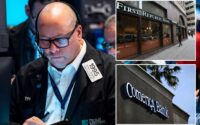Tel Aviv Stock Exchange denies reports of unusual trading before Oct. 7
The Tel Aviv Stock Exchange on Tuesday pushed back on an explosive report by a pair of prominent US researchers suggesting Hamas terrorists may have profited by betting against Israel’s economy before the deadly Oct. 7 attack.
Law professors Robert Jackson Jr. from New York University and Joshua Mitts of Columbia University published the report — titled “Trading on Terror?” — that found significant short-selling of shares leading up to the attacks.
The activity, they said, “exceeded the short-selling that occurred during numerous other periods of crisis” such as the 2008 financial crisis and COVID-19.
They wrote that for investors in Leumi, Israel’s largest bank, 4.43 million shares sold short over the period Sept. 14 to Oct. 5 yielded profits of 3.2 billion shekels ($859 million).
But the Tel Aviv Stock Exchange (TASE) said the authors miscalculated, because share prices are listed in agorot, which are similar to cents and pence, rather than shekels — putting the potential short sale profit at just 32 million shekels, or $8.6 million.
Yaniv Pagot, head of trading at the exchange, said that in looking at short interest in Leumi, there was an increase of some 4.5 million shares in the week ending Sept. 21 and the position then remained stable.
“I don’t see in the data something even close to what they wrote in the paper,” Pagot told Reuters, adding that the researchers didn’t speak to the TASE or its members.
“There was nothing unusual in short positions in the stock exchange in the two months before the attack.”
Pagot also said the short position in Leumi was taken by an unidentified Israeli bank known to the TASE, though he shied away from disclosing any more about the entity’s identity.
Pagot said of the media speculation that Hamas was somehow behind the short selling: “We know their [Leumi’s] compliance is very strict so it’s unlikely that such a position that came from a terror organization can pass through this member’s compliance for money laundering or something like that.”
The pair of researchers have since corrected their 67-page report to reflect the correct profits on the positions at Leumi, they confirmed to The Post.
“Our findings on short interest, the Israeli ETF and short-dated options remain unchanged,” Mitts said, referencing the 227,000 short transactions made on the Enterprise Investment Scheme (EIS), a security traded on the New York Stock Exchange that gives investors exposure to Israeli exchange-traded funds through the MSCI Israel ETF.
Pagot argued that he did not understand “the theory about the ETFs.”
The windfall on these 227,000 short positions on the EIS — which tracks the main indices on the TASE, including the most prominent Israeli companies — yielded somewhere between $1 million and $2 million in profit depending on whether it was recognized in the days or weeks after Hamas’ Oct. 7 ambush massacre.
Making an investment in EIS is thought to be similar to betting on the Israeli economy. Thus, such a volume of short-selling positions is significant because “it is extremely unlikely that the volume of short selling on Oct. 2 occurred by random chance,” Jackson and Mitts reported.
Whoever made the hefty bet that the Israeli economy would fail on Oct. 2 profited handsomely as the value of EIS fell by 7.1% on Oct. 11, the first day the US market was open after the massacre, per Israeli newspaper Haaretz.
Stay on top of news out of the Israel-Hamas war and the global surge in antisemitism with The Post’s Israel War Update, delivered right to your inbox every Monday, Wednesday and Friday.
Nearly a month after the horrific event — which saw at least 1,200 Israelis killed and more than 240 taken hostage — EIS lost 17.5% of its value, the outlet reported.
Israel’s securities regulator said it had been aware of the report for a week and was in contact with the researchers, but declined to comment while it investigates the TASE’s rebuttal.
Haaretz, citing anonymous Israeli sources, said Hamas has financially savvy members, and it isn’t implausible that they were behind these shorts.
If the trades were, in fact, made by someone affiliated with Hamas or were done on Hamas’ behalf, US authorities could freeze the ill-gotten gains, as American laws prohibit the financing of terror, Haaretz noted.
The professors also referred to patterns in early April, when it was reported that Hamas was initially planning its attack on Israel.
“Short volume in EIS (the MSCI Israel ETF) peaked on April 3 at levels very similar to those observed on Oct. 2, and was far higher by an order of magnitude than other days prior to April 3,” they said.
The professors said the latest mass short-selloff occurred at a rate that exceeded “numerous other periods of crisis,” including the financial crisis of 2008, the Israel-Gaza war in 2014 and even the COVID-19 pandemic.
With Post wires


